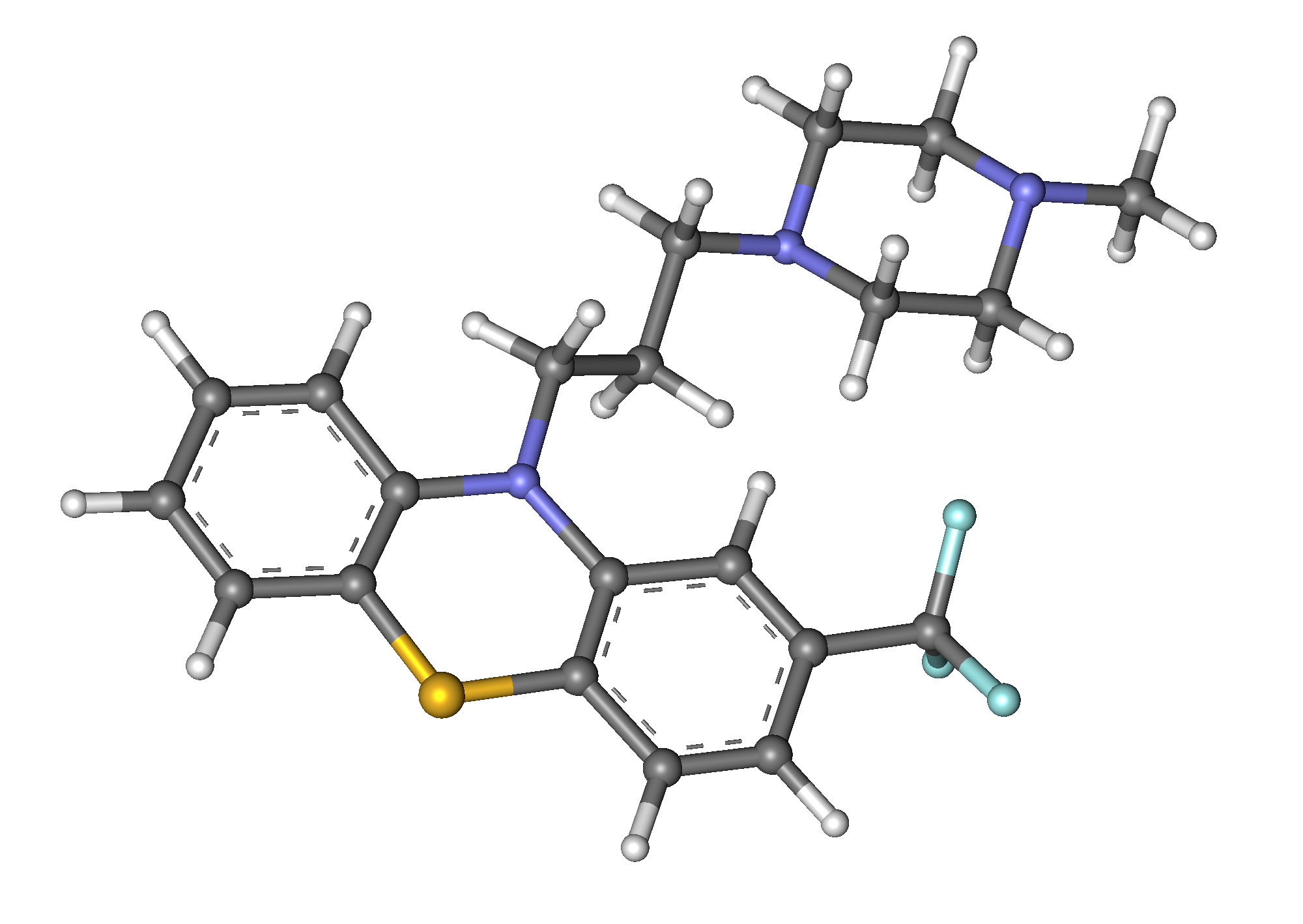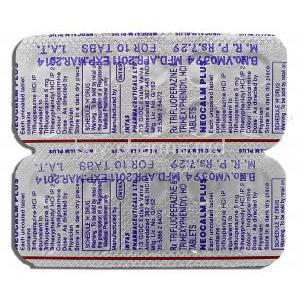Trifluoperazine
- I. Introduction to Trifluoperazine
- II. Composition and Pharmacokinetics of Trifluoperazine
- III. How Trifluoperazine Works: Mechanism of Action
- IV. Approved Uses of Trifluoperazine
- V. Off-Label Uses of Trifluoperazine
- VI. Dosage and Administration Guidelines for Trifluoperazine
- VII. Important Precautions and Contraindications
- VIII. Special Considerations for Administration
- IX. Interactions between Trifluoperazine and Other Substances
- X. Side Effects of Trifluoperazine
- XI. Overdose Information and Handling Precautions
- XII. Storage Information for Trifluoperazine
- XIII. Concluding Remarks
I. Introduction to Trifluoperazine
A. Overview of Trifluoperazine
Trifluoperazine, commonly known as 'Stelazine,' is a medication used to effectively treat severe mental illnesses such as schizophrenia. It belongs to the group of typical antipsychotics that emerged in the mid-20th century bringing about groundbreaking advancements in the treatment of various psychiatric disorders. Additionally, Trifluoperazine is recognized for its ability to alleviate intense nausea and vomiting.
B. Historical Development and Approval
Trifluoperazine has been around since the 1950s. It has played a crucial role in managing severe psychiatric conditions. Developed by SmithKline French, this medication was approved by the U.S. Food and Drug Administration (FDA) in 1959. It quickly became a trusted tool for doctors in treating schizophrenia and other disorders linked to psychosis. Throughout the years it has remained an option for antipsychotic therapy although healthcare professionals have always approached it with careful consideration due to possible side effects.
II. Composition and Pharmacokinetics of Trifluoperazine
A. Chemical Composition and Structure
Trifluoperazine, classified as a phenothiazine antipsychotic, is chemically known as 10 [3 (4 methylpiperazin 1 yl)propyl] 2 (trifluoromethyl) 10H phenothiazine. It belongs to a group of compounds with a three-ring structure that gives it its pharmacological characteristics. The presence of the trifluoromethyl group enhances its ability to dissolve in fats, making it easier for the compound to pass through the blood-brain barrier.

B. Pharmacokinetic Properties: Absorption, Metabolism, and Excretion
Trifluoperazine, along with phenothiazines undergoes various intricate biological processes that include absorption, distribution, metabolism, and excretion. After taking it it gets absorbed efficiently from the digestive system and then spreads throughout the body. It mainly attaches to plasma proteins. It can cross the blood-brain barrier. The liver plays a role in metabolizing it through the Cytochrome P450 enzyme system. Eventually, the kidneys eliminate the metabolites from the body.
III. How Trifluoperazine Works: Mechanism of Action
A. Interaction with Dopamine Receptors
Trifluoperazine primarily exerts its effects by blocking certain types of dopamine receptors, particularly D2 receptors. This action helps regulate the activity of dopamine, a neurotransmitter that plays a significant role in the symptoms experienced by individuals with schizophrenia. By targeting pathways in the central nervous system, such as the mesolimbic pathway, this inhibition of dopamine D2 receptors helps alleviate psychotic symptoms such as hallucinations and delusions.
B. Effect on Neurotransmission in the Central Nervous System
In addition to adjusting dopamine activity, Trifluoperazine also impacts other neurotransmission systems within the central nervous system. It acts against adrenergic receptors, which contributes to its calming effects. Additionally, it displays properties that can potentially result in side effects such as dry mouth and constipation. Nevertheless, the ranging impact of Trifluoperazine on the central nervous system highlights its significant potential for treating psychiatric disorders.
IV. Approved Uses of Trifluoperazine
A. Use in Schizophrenia Treatment
Trifluoperazine has long been used to treat schizophrenia, a severe and persistent mental disorder that affects various aspects of a person’s thinking, perception, emotions, language, self-awareness, and behavior. By blocking receptors in the brain called D2 dopamine receptors, Trifluoperazine helps to alleviate the presence of positive symptoms commonly associated with schizophrenia. These symptoms often include hallucinations, delusions, and disturbances in thought. Its effectiveness in addressing these symptoms has established its importance in managing this disorder12.
Here are some references that you can check out for more information:
B. Use in Managing Severe Nausea and Vomiting
Trifluoperazine is a highly effective remedy for managing intense nausea and vomiting. This medication works by blocking the dopamine receptors in the brain that activate the reflex to vomit12.
Here are some references that you can check out for more information:
C. Other Approved Clinical Applications
Trifluoperazine has been approved for the treatment of psychotic anxiety when other treatments have not been successful, thanks to its strong psychoactive properties. It can effectively manage short-term anxiety symptoms by inducing an effect through its α-adrenergic antagonistic activity. However, it is essential to exercise caution due to side effects that may occur12.
Here are some references that you can check out for more information:
V. Off-Label Uses of Trifluoperazine
A. Use in Anxiety Disorders
While Trifluoperazine is not explicitly approved for anxiety disorders, it has been used off-label because it has calming effects. Sometimes, healthcare professionals may temporarily prescribe it to manage severe anxiety when other treatments are ineffective. However, caution should be exercised when using it off-label to prevent the development of tardive dyskinesia, a condition characterized by involuntary movements12.
Here are some references that you can check out for more information:
B. Potential in Bipolar Disorder Management
There seems to be growing interest in exploring the role of Trifluoperazine in managing bipolar disorder, especially during manic episodes. Although it hasn’t been officially approved for this purpose, research findings indicate that it may offer benefits. The drug’s effect on dopamine transmission is believed to contribute to stabilizing mood swings commonly associated with bipolar disorder. However, it is essential to research to confirm these initial observations1.
Here are some references that you can check out for more information:
C. Research Findings for Other Unapproved Indications
Throughout the years, there have been indications of potential uses for Trifluoperazine beyond its approved purposes. Some of these applications include conditions like Tourette syndrome and the treatment of hiccups. However, it is essential to note that these uses are still in the stage, and further extensive studies are necessary to fully comprehend the safety and effectiveness of Trifluoperazine in these specific contexts123.
Here are some references that you can check out for more information:
VI. Dosage and Administration Guidelines for Trifluoperazine
A. Standard Dosing Information
The recommended amount of Trifluoperazine can differ significantly based on the specific condition being addressed. In the case of schizophrenia in adults, it is common, to begin with doses of 2 5mg taken two or three times a day. As for maintenance doses, they typically fall within the range of 15 to 20mg per day. In instances of psychotic anxiety, a typical dosage would be 1mg taken two or three times daily.
B. Dose Adjustments for Specific Populations
The dosage of trifluoperazine should be adjusted according to how the patient responds and their tolerance. When it comes to patients or those with liver problems,, the dosage should be lowered and given carefully because their metabolism is reduced. In general we avoid giving trifluoperazine to children unless the benefits outweigh the risks.
C. Directions for Proper Drug Administration
Trifluoperazine is usually taken by mouth. It can be consumed with or without food. It is advisable to take the medication at the time every day to maintain consistent therapeutic levels. If a dose is forgotten, it should be taken soon as remembered unless it's almost time for the next scheduled dose. Stopping Trifluoperazine abruptly may result in withdrawal symptoms, so any discontinuation should be done gradually and under supervision.
VII. Important Precautions and Contraindications
A. General Safety Considerations
Trifluoperazine is a medication that should always be taken with the guidance of a healthcare professional. It's essential to be aware of the risk of developing tardive dyskinesia, which causes involuntary muscle movements, particularly in the face. This risk is more significant when using trifluoperazine for periods and in older individuals. Moreover, trifluoperazine may lower the seizure threshold, which could be concerning for those with a history of seizures.
B. Contraindications: When Trifluoperazine Should Not be Used
Patients with hypersensitivity should not use trifluoperazine to phenothiazines, those in an unconscious state, and individuals with drug-induced liver diseases. It is also not recommended for people with blood disorders or those experiencing depression. Moreover, it is contraindicated in patients suspected of having brain damage as it poses an increased risk of potentially fatal neuroleptic malignant syndrome.
C. Precautions in Patients with Specific Medical Conditions
Trifluoperazine must be given with caution to individuals with cardiovascular disease, impaired kidney or liver function, Parkinsons' disease, and glaucoma characterized by narrow-angle. Moreover, considering the potential risks before prescribing this medication to patients with severe respiratory conditions, like chronic obstructive pulmonary disease (COPD), is essential.
VIII. Special Considerations for Administration
A. Administration to Elderly Patients
Older individuals have a vulnerability to experiencing the negative impacts of trifluoperazine, such as tardive dyskinesia, orthostatic hypotension, sedation, and Parkinsonian effects. As a result, it is advisable to prescribe patients with lower doses within the therapeutic range and closely observe them for any adverse reactions.
B. Use in Pregnant Women and Nursing Mothers
Trifluoperazine should be used during pregnancy only if the benefits outweigh any risks to the unborn baby. It falls under FDA pregnancy category C, which suggests that it could potentially harm the developing fetus. Additionally, nursing mothers should exercise caution as it can be excreted in breast milk, posing a risk to the nursing infant.
C. Administration to Pediatric Patients
Trifluoperazine has not been extensively studied for its safety and effectiveness in patients. As a result, it is generally not advised to use it in this population unless the potential benefits outweigh the risks. Close monitoring of children is essential to detect any side effects or behavioral changes if utilized.
IX. Interactions between Trifluoperazine and Other Substances
A. Drug-Drug Interactions
Trifluoperazine has interactions with different medications. It can strengthen the effects of substances that depress the nervous system, such as alcohol, opioids, and benzodiazepines, resulting in increased sedation. It can also have an impact on drugs leading to additional anticholinergic effects. Medications, like rifampicin. Phenytoin that triggers liver enzymes may reduce the therapeutic effects of Trifluoperazine. Therefore, understanding a patient's medication history before starting treatment is crucial.
B. Food and Lifestyle Interactions
Patients who are on trifluoperazine should refrain from consuming alcohol as it can intensify the soothing effects. Individuals taking this medication should also be advised against engaging in activities such as operating machinery or driving as it may cause drowsiness and impair motor functions. It is also recommended to limit sun exposure since trifluoperazine can heighten the sensitivity of the skin to UV rays, thus raising the chances of getting sunburned.
C. Impact of Interactions on Efficacy and Safety
The effectiveness and safety of trifluoperazine can be significantly affected by its interactions with substances. Interactions can increase the risk of side effects, reduce the effectiveness of the treatment and even lead to severe conditions like neuroleptic malignant syndrome. Therefore both patients and healthcare providers need to be aware of interactions to maximize the benefits of trifluoperazine while minimizing any potential risks.
X. Side Effects of Trifluoperazine
A. Common Side Effects: Mild to Moderate Reactions
Trifluoperazine can cause side effects like dry mouth, blurred vision, constipation, and drowsiness. Patients might also feel lightheaded, become more sensitive to sunlight, and notice changes in their appetite or weight. It's important to remember that these side effects are usually mild and tend to lessen as the body gets used to the medication.
B. Severe Side Effects and Adverse Reactions
Although trifluoperazine typically causes side effects, there are cases where it can lead to more severe reactions. These may involve nervous system responses like tardive dyskinesia, neuroleptic malignant syndrome, and seizures. Additionally, there have been reports of cardiovascular effects such as arrhythmias and hypotension. Patients must seek medical assistance promptly if any of these side effects manifest.
C. How to Manage Side Effects
When it comes to dealing with side effects, some steps can be taken. One option is adjusting the medication dosage, while another involves managing the symptoms. In severe cases discontinuing the use of the drug may be necessary. A simple solution could involve regularly sipping water for side effects like dry mouth. Similarly, dietary changes can help manage constipation. It's always important to seek advice from a healthcare professional regarding handling any side effects effectively.
XI. Overdose Information and Handling Precautions
A. Signs and Symptoms of Trifluoperazine Overdose
Taking much trifluoperazine can lead to symptoms like extreme drowsiness, muscle rigidity alterations, awareness, and seizures. Additionally, it may cause heart rate, irregular heartbeat, and low blood pressure. If any of these signs occur, it is crucial to seek medical assistance.

B. Management of Overdose: Immediate Steps and Follow-up Care
To manage an overdose the first step is to stop taking the drug and seek medical help. Typical treatments involve cleaning out the stomach, closely monitoring signs, and providing necessary care. It's important to remember that there are no antidotes for trifluoperazine, underscoring the significance of preventing overdose altogether.
C. Tips for Avoiding Overdose and Ensuring Safe Use
It is essential to educate patients about using trifluoperazine to avoid overdosing. Some tips to keep in mind are; always stick to the dosage, never share the medication with others, and make sure to have regular checkups with healthcare professionals. Additionally, it's essential to store the medicine in a place away from children to prevent any accidental ingestion.
XII. Storage Information for Trifluoperazine
A. Ideal Storage Conditions
Trifluoperazine should be kept at room temperature away from both light and moisture. It is advisable not to store it in the bathroom due to the humidity levels. Additionally, it is essential to prevent the forms of this medication from freezing.
B. Guidelines for Safe and Appropriate Storage
It is essential to store medication by keeping it in its original container and ensuring it is out of the reach of children and pets. When a prescription expires or is no longer needed, it should be safely disposed of through a drug take-back program.
XIII. Concluding Remarks
A. Summarizing the Importance of Trifluoperazine in Healthcare
Trifluoperazine holds value as a beneficial asset among antipsychotic medications. It plays a role in treating schizophrenia and other severe mental health disorders aiding individuals in regaining stability. Importantly it also exhibits the potential for alleviating nausea and vomiting and various off-label applications.
B. Encouraging Responsible Use and Ongoing Patient Education
Trifluoperazine can undoubtedly be helpful. It's essential to use it responsibly with the guidance of a healthcare professional. Patients should receive education on its appropriate usage, potential side effects, and signs of overdose. The main objective is maximizing the benefits while minimizing risks, ultimately leading to improved quality of life for patients who rely on trifluoperazine.













